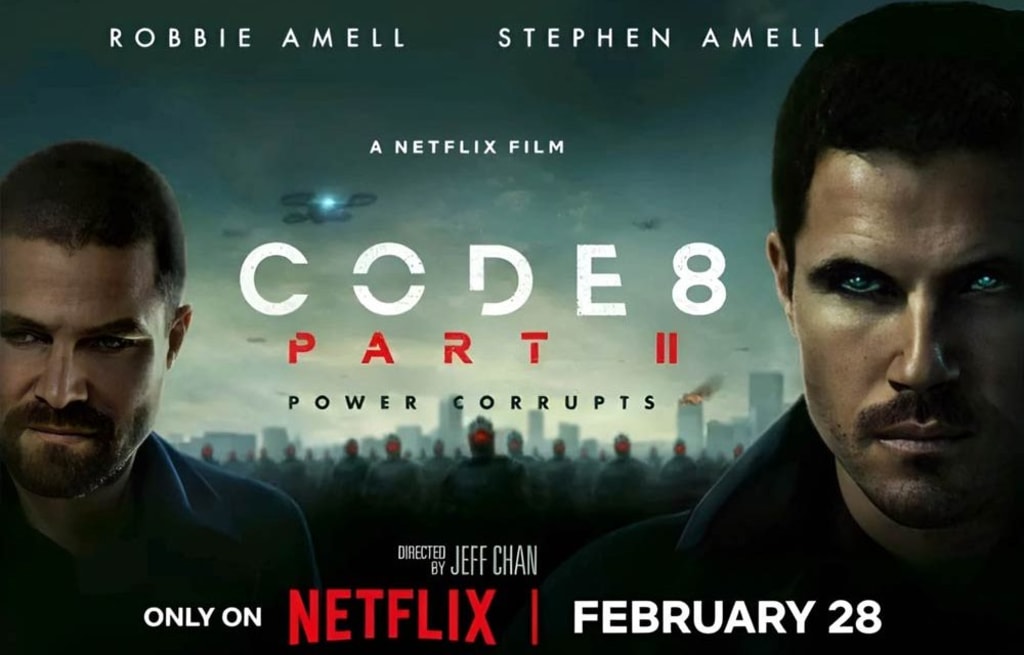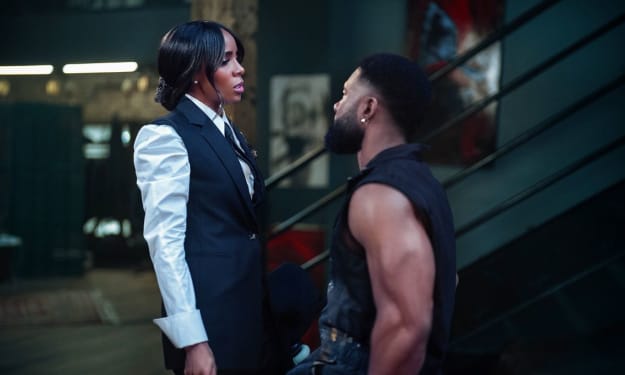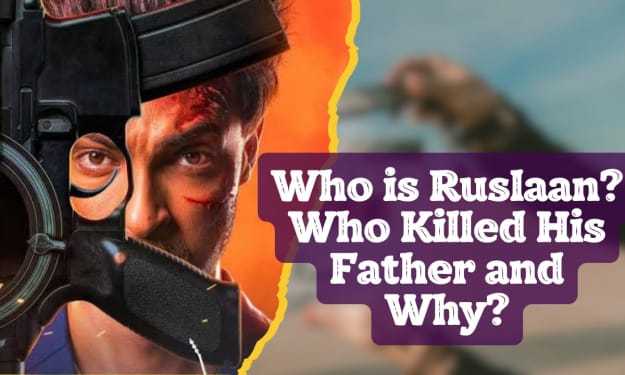Code 8: Part II (2024) Movie Review
Action / Crime / Drama / Sci-Fi / Thriller

In the blossoming spring of 2020, Jeff Chan unveiled his thought-provoking anti-police sci-fi action masterpiece, "Code 8." The film, a brainchild of the talented cousins Robbie and Stephen Amell, although largely overlooked upon its release, delved into pertinent themes of our time. Despite the unfortunate demise of the planned sequel series on Quibi, the franchise has been resurrected with a Netflix-backed sequel. "Code 8: Part II" continues the tradition of its precursor, employing the canvas of high-concept sci-fi to cast a critical eye on the escalating brutality of a militarized police regime, especially in an era dominated by surveillance.
Fast forward five years from the original narrative, where Robbie Amell embodies the character of Connor, a recently liberated small-time criminal. Stephen Amell portrays Garrett, Connor's partner-in-crime, with whom he embarks on a perilous journey to save his ailing mother. Both protagonists are among the 4% of Lincoln City’s populace labeled as "Powers," individuals endowed with superhuman abilities. However, Powers face systematic discrimination, relegating them to the fringes of society, ensnared in poverty and subjected to relentless police scrutiny.
The initial installment explored how this marginalized existence coerced many Powers into concealing their gifts or resorting to illicit means for survival. Additionally, their extraordinary abilities became commodities for the production of Psyke, a highly addictive substance derived from their spinal fluid, perpetuating a vicious cycle of trafficking and corruption within the community.
The narrative intertwines Connor’s fate with Officer Park (Sung Kang), whose moral compass is jarred awake by the pervasive corruption within the law enforcement apparatus. "Part II" delves deeper into this theme, introducing the ambitious Sergeant "King" Kingston (Alex Mallari Jr.), a pivotal figure who spearheads a new robotic policing initiative. Taking cues from the eerie robotic canines employed by the NYPD, King endeavors to replace the previously deployed lethal robotic enforcers, known as "Guardians," with a supposedly less-violent alternative. However, his involvement in the Psyke trade exposes the insidious nexus between law enforcement and organized crime.
King attempts to curry favor with the community by showcasing the K9 robot cops at a block party, unveiling a unit named Piper. Yet, when one of these ostensibly non-lethal units fatally assaults one of Garrett's associates, it becomes apparent that they can be manipulated by human operators to commit violence. Pavani (Sirena Gulamgaus), Tarak's resourceful younger sister, equipped with the ability to disrupt and neutralize the K9 units, captures incriminating footage, exposing the fallacy of the authorities' claims of employing peaceful measures to maintain order.
Subsequently, King marks Pavani for elimination, prompting Connor and Garrett to form an unlikely alliance to safeguard her. Amidst the intricate web of alliances and betrayals, Officer Davis (Aaron Abrams) emerges as a peripheral ally to Connor, blurring the lines between righteousness and complicity in the systemic rot. As the narrative hurtles towards its inevitable climax, the film wrestles with the perennial question: is the malaise within law enforcement an aberration attributable to a few rogue elements, or is it an intrinsic flaw ingrained within the system itself?
While the sequel maintains the visual panache established by its predecessor, courtesy of Chan's adept world-building, it falters in terms of narrative coherence. Collaborating with co-writers Sherren Lee and Jesse LaVercombe alongside Chris Paré, the sequel grapples with an overabundance of plot threads, diluting the impact of its central themes. However, the film compensates with exhilarating action sequences, anchored by the committed performances of both Amells, who infuse their characters with gravitas amidst the chaos.
Regrettably, "Part II" struggles to strike a balance between its pulse-pounding heist narrative and the poignant human moments that endeared audiences to the original film. Character development takes a backseat to the relentless propulsion of the plot, depriving the narrative of emotional depth. Nevertheless, a late-game revelation regarding King's motives injects a fresh dimension to the discourse on assimilation versus communal solidarity, albeit underexplored.
In its earnest endeavor to confront the specter of militarized policing and challenge the conventions of copaganda cinema, "Code 8: Part II" culminates in a crescendo of optimism, predicated on the belief that exposure of institutional malfeasance can catalyze substantive reform. Yet, in a world marred by entrenched power structures and systemic inertia, such idealism appears increasingly naive. Perhaps therein lies the film's greatest strength—the audacity to envision a reality where communities triumph over oppression, even in the face of insurmountable odds.
As the credits roll, one is left pondering whether the fantastical notion of a city reallocating resources from law enforcement to community initiatives is a figment of cinematic imagination or a harbinger of a more equitable future. In an era besieged by cynicism and despair, perhaps it is precisely this brand of hopeful speculation that serves as a beacon of possibility, igniting the flames of collective resistance against injustice.






Comments
There are no comments for this story
Be the first to respond and start the conversation.